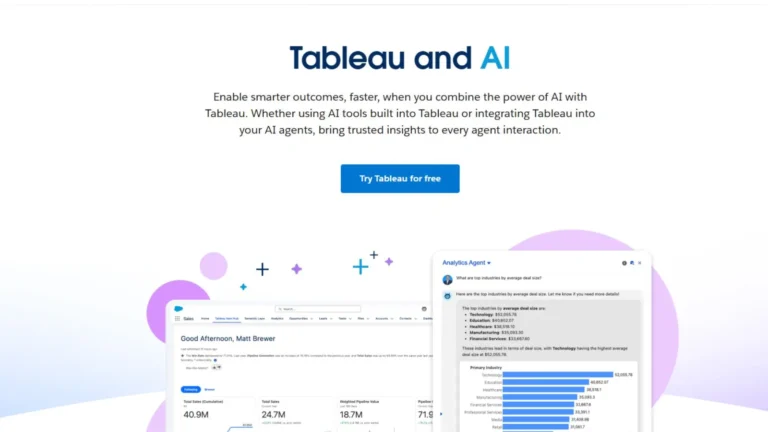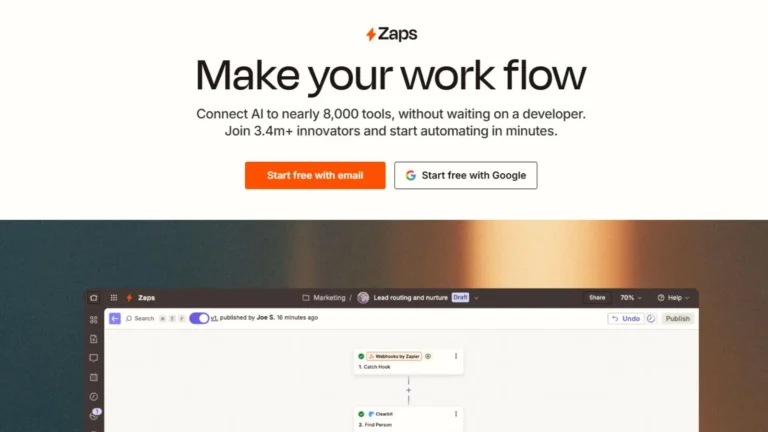As images become an increasingly significant part of the internet, it’s more important than ever to review, track, and validate them online. Journalists weeding out fake content, as well as photographers wanting to copyright their images, have found reverse image search to be important. Lenso AI is a new AI platform that significantly enhances reverse image search and facial recognition capabilities.
Users of Lenso AI can look up topics online by showing pictures, thanks to its use of artificial intelligence, deep learning and computer vision. It works by noticing duplicates, but can also detect images that are like one another, monitor where those images appear and find familiar faces too, so it is useful in many sectors.
What does Lenso AI do?
Lenso AI is designed to be a reverse image search and AI facial recognition tool on the web. Rather than entering text as in most search engines, Lenso enables users to search by uploading an image and looking for the same or similar images online. Because of it, we can implement use cases like:
1. Noticing where an image can be found on websites
2. Noticing when someone uses your images without your permission
3. Discovering the environment or origin of an image
4. Checking whether a photo is genuine
Unlike standard reverse search tools like Google Images and TinEye, Lenso goes deeper in its analysis. The algorithms in Lenso allow it to find similarities in the faces, notice minor changes and work well when faces are central.
Core Features of Lenso AI
1. Service for searching in reverse
At the centre of Lenso is the way it lets users search for visual content. Users only need to select an image, and Lenso will identify its type or a similar one quickly. It is helpful for checking what content is genuine, confirming copyright or collecting stock photographs.
2. Facial Recognition Search
The software is enhanced with facial recognition so images of particular people can be found. You can determine where an image of someone appears on the internet, no matter whether it is there with authorisation or not. It becomes very important for influencers, public figures and those paying close attention to digital privacy.
3. Duplicate Image Detection
Lenso doesn’t limit itself to making things look identical. It locates duplicates that have been changed by being resized, filtered, cropped or slightly altered. As a result, it finds cases where creators use someone else’s work without giving credit.
4. AI-Powered Similar Image Discovery
Not only does Lenso detect duplicate pictures, but it can also recognise images with similar visuals, such as the same arrangement or background, from different files. As a result, journalists can link their work to similar stories, and designers can choose appropriate photos or graphics.
5. Website and Domain Filtering
Users may sort their search results by surfacing domains, image types or keywords. It leads to precise results and allows you to find what you’re searching for easily.
6. Dashboard and Analytics for Users
Lenso allows you to review your uploaded images, see where they appear and review your recent searches on a straightforward dashboard.
7. Protections for Security and Privacy
Since facial and image data are sensitive, Lenso focuses on encryption and safe storage. What you upload is managed using strong privacy rules.
Use Cases for Lenso AI
Lenso AI helps people and businesses in many different industries.
1. Content Creators and Photographers.
Those who work in the visual arts can keep watch over their work online, protect their creative rights and request credit or take further steps when necessary.
2. Digital Marketers and Their Agencies
Using data, agencies monitor a brand’s performance online and watch for competitors copying their creative content.
3. Online journalists and fact-checkers
Using Lenso, you can discover where an image came from to detect deepfakes, staged scenes or altered photos being spread in disinformation.
4. E-commerce and the retail industry
Merchants can spot fake items online by cross-checking the pictures of products with the listed goods on different marketplaces.
5. People with influence in society
Anyone famous can follow where their pictures or their name are used on blogs and in online posts.
6. Law Enforcement and Investigations
Officials may use Lenso to discover where a suspect’s photo appears online or to discover groups of people misusing images.
Advantages of Lenso AI
1. High Accuracy in Image Matching
Because of machine learning, Lenso is much better at recognising images than common tools. That it can copy, alter, and lower-quality images gives it a big advantage.
2. Facial Recognition for Individuals
Facial recognition isn’t used only in crime or at borders: it also protects the privacy of normal people.
3. User-Friendly Interface
There’s no need to be a data expert to take advantage of Lenso. Since it’s so easy to use with dragging and a useful dashboard, both beginners and experts can work with it.
4. Search Filters You Can Customise
Easily find what you need by using date, domain, category and visual similarity options to eliminate unwanted search results.
5. Freemium Model
If you use Lenso, you can search for various metrics without cost, although you’ll need to pay to experience all the sophisticated features.
6. You Don’t Need Technical Knowledge
You don’t need coding knowledge or to work with APIs or machine learning. It is designed for people who think in pictures.
7. Multilingual Support
Using Lenso, searchers from many places around the world can benefit from the service in their native language.
Disadvantages of Lenso AI
1. You Have To Pay
You can only do a certain number of searches each day, you cannot see all results at full resolution, and you cannot save any reports with the free version. Regular users may have to replace their old devices.
2. Dependence on the Internet
Lenso runs on the cloud, so you cannot access it if you lose your internet connection. Because of this limitation, the application is less suitable for use in remote or restricted networks.
3. Privacy Concerns
Although Lenso promises encryption and data privacy, once you upload private pictures online, it is generally less secure, with facial images at the biggest risk.
4. Issues the Law Faces with Facial Recognition
Some countries prohibit the use of facial recognition because of protection laws (for example, GDPR in the EU and CCPA in California). There are places where Lenso must watch what it does to avoid breaking laws.
5. Restrictions on the Image Database
Although Lenso looks through a wide range of content, it is not able to access private networks, closed information or web pages that are not indexed, which may result in unnoticed image cases.
Comparison With Other Image Search Tools
| Feature | Lenso AI | Google Images | TinEye | PimEyes |
| Reverse Image Search | Yes | Yes | yes | Yes |
| Facial Recognition | Advanced | No | No | Yes |
| Modified Image Detection | Strong | Limited | Basic | Moderate |
| Privacy Controls | Strong | Basic | Mixed | Varies |
| Free Tier Availability | Yes | Yes | Yes | Yes |
| Reporting/Analytics | Yes | No | No | Yes |
| Target Audience | Professionals | General Users | General Users | Facial searchers |
Lenso AI is most similar to PimEyes, though with broader application and cleaner UX. It’s more powerful than TinEye and far more feature-rich than Google Images when it comes to copyright or face-based search.
Future Potential of Lenso AI
Among the possible strategies on Lenso AI’s roadmap are:
1. For people who want to recognise images on the go, download our app.
2. API usage is needed for developers to make reverse image search a feature in their applications
3. To assist in confirming whether an image is authentic by decentralised checking
4. For greater privacy, you need to use tools that search the Deep Web.
With these updates, users can enjoy better work, as Lenso becomes relied on in the visual industry sectors.
Final Verdict
With Lenso AI, we get a modern platform that makes using images online more engaging and user-friendly. If you want to safeguard IP, confirm the authenticity of a product or identify where a photo comes from, Lenso gives you useful AI tools for the job.
This platform is distinguished by its facial recognition and modified image detection. Although the platform lacks some paid features and has privacy questions, visual media specialists will still see it as incredibly useful.




